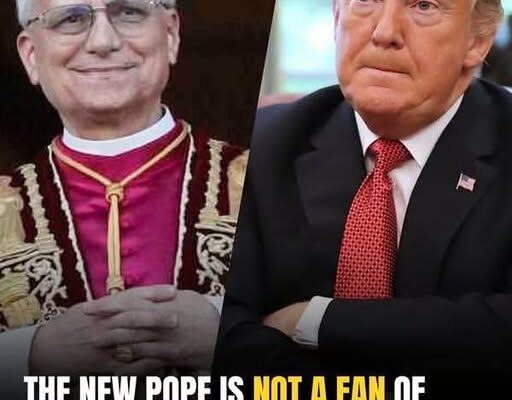First American Pope Criticized Trump & Vance In Tweets — Now Leading The Church

In a landmark moment for the Catholic Church and a groundbreaking development in global religious history, Cardinal Robert Prevost of Chicago has been elected as the new pope, taking the name Pope Leo XIV. His election marks the first time an American has ascended to the papacy, breaking centuries of tradition and sparking widespread reflection about the future direction of the Roman Catholic Church.
Cardinal Prevost’s journey to the papacy has been nothing short of extraordinary. Born and raised in the heart of Chicago, a city known for its cultural diversity and deep-rooted Catholic heritage, Prevost entered religious life with a commitment to social justice, pastoral outreach, and theological scholarship. Over the decades, his work took him far beyond the urban neighborhoods of his hometown and deep into the heart of Latin America, where he developed strong ties with communities facing poverty, displacement, and political upheaval.
A Life of Service Across Continents
Much of Prevost’s pastoral mission unfolded in Peru, where he served for many years and earned widespread respect for his dedication to local parishes, his fluency in Spanish, and his deep understanding of the cultural and spiritual needs of the region. His work among Latin American communities forged strong relationships with people navigating the challenges of migration, systemic inequality, and environmental degradation — issues he would later address on the world stage.
His firsthand experiences in Latin America helped shape his worldview and inform his advocacy for vulnerable populations. That global perspective became a defining feature of his ministry, guiding his approach to complex moral and social issues facing the Church and the world. It also brought him into occasional tension with political leaders, particularly over matters involving immigration and human dignity.
A Vocal Advocate for Immigrant Rights
One of the most defining aspects of Pope Leo XIV’s public service, prior to his election, was his consistent and outspoken advocacy on behalf of immigrants, refugees, and undocumented communities. While still a cardinal, Prevost made headlines for his candid critiques of policies enacted during former U.S. President Donald Trump’s administration — especially those related to immigration enforcement.
He did not shy away from publicly condemning what he saw as morally troubling actions, including the policy that separated children from their parents at the U.S.-Mexico border. In a 2018 statement shared on social media, then-Cardinal Prevost described the family separation policy as “un-Christian,” emphasizing that faith demands compassion, mercy, and a commitment to upholding the inherent dignity of every person, regardless of legal status.
His words resonated with many within the Catholic community and beyond, particularly with those who had experienced or witnessed the emotional and psychological toll of family separation firsthand. By aligning his pastoral mission with the Church’s teachings on social justice and the sanctity of family life, Prevost positioned himself as a moral voice willing to confront difficult truths.
Support for DACA Recipients and Migrant Communities
Beyond his critique of specific policies, Pope Leo XIV has also been a strong supporter of the Deferred Action for Childhood Arrivals (DACA) program in the United States. He has repeatedly expressed solidarity with Dreamers — young undocumented immigrants who were brought to the U.S. as children — describing their aspirations, fears, and contributions as emblematic of the American spirit and worthy of protection.
In various interviews and statements, Prevost emphasized that faith communities have a responsibility to stand with the marginalized and vulnerable. His deep empathy for the struggles faced by migrants, refugees, and undocumented families became a central part of his public identity, further distinguishing him within the College of Cardinals.
A Surprising but Symbolic Election
Despite his global reputation and spiritual leadership, Prevost’s elevation to the papacy came as a surprise to many observers. For centuries, the Vatican has followed a general — though not codified — tradition of avoiding the election of a pope from the United States, largely due to concerns about political influence and global perception. The United States’ position as a geopolitical superpower has often made the prospect of an American pope controversial, with critics fearing that such a figure might be perceived as overly aligned with Western political interests.
Yet in electing Robert Prevost, the conclave of cardinals signaled a willingness to break with tradition in favor of a new pastoral vision — one that emphasizes global unity, pastoral empathy, and a clear commitment to peace and communication across cultures. His election may reflect the Church’s recognition of the need to connect more deeply with Catholics in the Americas, a region that is home to some of the largest Catholic populations in the world.
A Message of Peace and Unity in His First Address
In his first public address as pope, Leo XIV stood before thousands gathered in St. Peter’s Square and offered a message that was both heartfelt and hopeful. Choosing to speak in both Spanish and Italian, the new pope demonstrated his commitment to accessibility and inclusivity. His words centered around peace, dialogue, and mutual understanding — values he identified as essential to addressing the complex global challenges of the 21st century.
“We are all children of the same God,” he said. “Let us walk together, listen to one another, and embrace the dignity of every person, regardless of where they come from, the language they speak, or the journey that brought them here.”
The use of Spanish — a nod to his years of ministry in Latin America — was particularly well received by Spanish-speaking Catholics, many of whom felt a deep emotional connection to the new pontiff. His ability to communicate across linguistic and cultural lines may well be one of his greatest assets as he seeks to unify a Church that, like the world, faces internal divisions and external challenges.
Congratulatory Messages from Across the Political Spectrum
Interestingly, despite the historical tensions between Prevost’s advocacy and certain political leaders, both Donald Trump and Senator JD Vance publicly congratulated him on his election. Trump, in a brief but polite message, acknowledged the significance of the moment and wished the new pope success in leading the Catholic faithful. Vance, who has positioned himself as a vocal advocate for traditional values, similarly expressed support and respect for Leo XIV’s spiritual mission.
These statements of goodwill illustrate a broader recognition that the papacy transcends partisan boundaries. Regardless of past disagreements, many political figures understand the unique moral authority and influence the pope holds — not only for Catholics, but for people of all faiths and backgrounds.
A New Era for the Catholic Church?
As the world watches Pope Leo XIV begin his papacy, there is a sense that something new is unfolding within the heart of the Church. His election raises important questions: Will he continue to speak boldly on issues like immigration, climate change, and economic justice? How will he address the internal tensions within the Church, including debates over clerical reform, the role of women, and the inclusion of marginalized groups? Will his American roots influence how he navigates global diplomacy?
Only time will tell, but early signs suggest that Leo XIV is a pope committed to openness, engagement, and listening. His message of peace, his commitment to the poor and marginalized, and his willingness to speak difficult truths point to a vision of leadership that is as pastoral as it is prophetic.
Conclusion: A Hopeful Sign for a Divided World
In a time when the world is often fractured by political divisions, economic disparities, and cultural misunderstandings, the election of Pope Leo XIV may offer a beacon of hope. His personal story — from the neighborhoods of Chicago to the villages of Peru and now to the throne of St. Peter — reflects a lifetime of service rooted in compassion and global solidarity.
While challenges lie ahead, his ascension to the papacy represents a powerful reminder that leadership rooted in humility, empathy, and courage can still inspire hearts and minds. As Pope Leo XIV begins his journey as the spiritual leader of over a billion Catholics, his message is clear: the Church must be a place of welcome, dialogue, and hope for all — regardless of borders, politics, or background.
And in a divided world, that message may be more needed than ever before.



